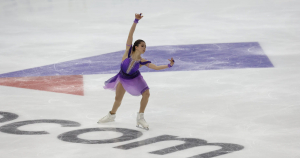
Figure skating scandals dominate Russia’s Winter Olympics

Unlike the Summer Olympics in Tokyo, which was remembered for open homophobia on Russian state-owned television, the Winter Olympics in Beijing produced genuine sporting drama. But, once again, the Russian team was the subject of serious doping allegations.
Rivalry, tears — and trimetazidine
Russia’s figure skaters won the team event in Beijing and took gold and silver in the individual contest. Despite these successes, there were tears and angry words. The biggest tragedy for the Russian team was the fourth-place finish for skater Kamila Valieva in the individual competition. A few days prior to this, the 15-year-old was accused of using banned substance trimetazidine. In her defense, Valieva said her grandfather uses the drug and that it must have entered her body as a result of accidental contact.
The suspicions around Valieva meant the medal ceremony for the Russian athletes after the team event was postponed. The skater herself was initially banned from further participation in the Olympics. But she contested the decision and was eventually given the green light to compete in the individual event Thursday. She led the field after the short program, but fell twice in the free program and ended up just missing out on a medal.
Valieva was widely expected to win gold and her failure to do so was a shock to many fans and observers. After the free program her coach, Eteri Tutberidze, greeted her abruptly: “Well, why did you let it end up like that? Why did you just give up the fight?”. State-owned TV channels Channel 1 and Rossiya 1 both complained that the youngster was “hounded”, “destroyed”, “killed” and “broken” by Olympic officials and Western journalists as a result of the doping allegations. Many Russian fans share those sentiments. Sports media outlet Championat described the “terrible tragedy of a young skater” and said “Valieva couldn’t cope with the weight of expectation and, under intense pressure, fell apart on the Chinese ice.” Newspaper Sport-Express said it was “a tragedy that should shame the IOC [International Olympic Committee]”.
Russian figure skater Alexandra Trusova, 17, won silver in the individual contest. In the process, she became the first skater in history to land five quadruple jumps. However, she lost out on gold to another Russian, 17-year-old Anna Shcherbakova. When Trusova realized that she had come second in the competition, she threw a public tantrum. “I hate everybody! I hate it! I never want to skate again, never in my life! I hate this sport! I’m never going on the ice again! It’s impossible, this can’t be allowed! Everyone else has a gold medal, but not me,” she told her coach. At the medal ceremony, Trusova burst into tears and refused to applaud her team-mate Shcherbakova.
Following the Valieva doping scandal, many in the sporting world have called for an age limit in figure skating. There was also widespread criticism of Valieva’s coach, Tutberidze, with IOC chief Thomas Bach among those who spoke out. The IOC will check for evidence that the 15-year old skater is being abused. Several figure skating fans and sports journalists accused the coach of sacrificing her skaters’ health for success and cultivating “one-off champions” who blaze a trail at the Olympics, but who then quickly burn out.
What else will the Olympics be remembered for?
Compared with the 2020 Summer Olympics, these games have led to little anger about Russian athletes once again competing as ‘Team ROC’, under a neutral flag, and with no Russian anthem at medal ceremonies. These restrictions are due to ongoing doping sanctions that were imposed after evidence of a state-sanctioned doping campaign in Russia during the 2014 Winter Olympics in Sochi. At other Olympic Games, there was far more anger over this issue among Russian officials, state propaganda ‘journalists’ and Russian fans. This time, though, hardly anyone paid attention. During the Opening Ceremony of the games, commentators on state-owned Channel 1 barely mentioned the fact that Russia’s athletes were without their national flag.
There was also less hostility toward Ukrainian athletes. During the Opening Ceremony in Tokyo, Channel 1 cut to a commercial break when the Ukrainian team entered the stadium. This time, however, there was no break in the broadcasting, and the Channel 1 commentators even said a few words about previous Ukrainian success at the Olympics. That said, a photo was later circulated on social media showing Putin ‘dozing off’ during the parade of the Ukrainian team. The Kremlin refused to comment.
Why the world should care: Figure skating is one of Russia’s favorite sports and the plight of the young Russian skaters has affected fans deeply. Things are complicated by the whiff of doping — the very issue that has caused so many difficulties for Russia’s Olympic team. Moreover, the doping probe into Valieva is ongoing — the Russian figure skating team may still be deprived of its gold.



